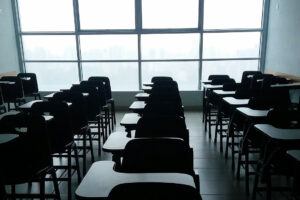When a school closes

The Department of Education (DepEd), by its Order No. 034, series of 2022, has set the start of classes on Aug. 22, to end on July 7, 2023. There will be 203 school days, or as may be determined by further issuance/s in case of changes in the school calendar due to unforeseen circumstances (deped.gov.ph/2022/07/12).
The options schools have to hold in-person (face-to-face or F2F) classes five times a week; or use blended learning (a combination F2F and online); or go totally online (full distance learning) will only be until Oct. 31. Starting Nov. 2, 2022, all public and private schools must have transitioned to five days of in-person classes. No school shall be allowed to implement purely distance learning or blended learning except for those implementing Alternative Delivery Modes as provided in DO 21, s. 2019 (Policy Guidelines on the K to 12 Basic Education Program) and DO 01, s. 2022 (Revised Policy Guidelines on Homeschooling Program).
Last week, on Aug. 15, the Colegio de San Lorenzo of Manila (CDSL) announced its sudden closure, the day before the scheduled opening of classes. “We have suffered financial instability and lack of financial viability brought about by the ongoing pandemic and exacerbated by consistent low enrollment,” the school said in an official statement.
“We are sorry about the sudden announcement, but it is better late than never. We couldn’t survive because our finances won’t permit us to operate anymore like paying the salaries of our teaching and non-teaching staff,” the college added (ucanews.com, Aug. 18, 2022).
More than 860 out of 14,000 private schools in the Catholic-majority nation have closed their doors since the pandemic hit two years ago, according to the Department of Education. The closures have affected 58,327 students and 4,488 teachers. The Catholic Educational Association of the Philippines reported that nearly 85%, or more than 700 of the schools that folded, were Catholic schools (Ibid.).
In the strict lockdowns early in the pandemic, schools closed because they had no enrollees. As the COVID-19 restrictions relaxed and tightened, enrollees were still lacking. Then-DepEd Secretary Leonor Briones noted in 2020 that over 398,000 private school students transferred to public schools, mainly due to the COVID-19 pandemic’s effect on the income of families.
The Commission on Higher Education (CHED) Chair J. Prospero de Vera is bristling about the non-compliance of the Colegio de San Lorenzo with the 60-day notice and the non-submission of various documents to justify the decision to close, which should include an audited financial report for citing financial loss as a reason for the closure. He cited possible “deceit” due to the collection of tuition and other fees (a contractual agreement) and then “arbitrarily” deciding not to open. Mr. De Vera ordered the Colegio de San Lorenzo to refund tuition and all other fees collected from enrollees (The Philippine Star, Aug. 16, 2022). In sympathy with the displaced students, many schools spontaneously offered to accept transferees. UST Angelicum, a private Catholic basic and higher education school run by the Dominican order, was one of the first to offer assistance under very considerate terms to the more than 717 students from nursery to Grade 12, and 652 college students, including 172 graduating students, affected by the CDSL closure (inquirerdotnet, Aug. 18, 2022). Teaching and non-teaching personnel of the CDSL will be endorsed to the QC Public Employment Service Office for possible financial assistance or prospective employment (pna.gov.ph, Aug. 16, 2022).
The Colegio de San Lorenzo is not the first school to close due to the COVID-19 pandemic. In 2020, the 109-year-old College of the Holy Spirit School in Manila (CHSM) announced that it will cease operations after academic year 2021-2022, citing difficulties in enrollment which were worsened by the coronavirus pandemic (ABS-CBN News, Nov. 22, 2022).
“Private education has faced an increasingly challenging environment resulting from (i) government policies on K-12; (ii) free tuition in state colleges and universities, local universities and colleges, and state-run technical and vocational institutions; and (iii) the significant increase in public school teachers’ salaries compared to their private school counterparts,” said Sr. Carmelita Victoria, provincial of the Mission Congregation of the Servants of the Holy Spirit, the order that ran the school (Ibid.).
“The recent COVID-19 pandemic has exacerbated the situation. The reduction or loss in family income, mobility restrictions and social distancing requirements, and the new demands of distance learning have adversely affected enrolment, not only in CHSM, but in most private schools as well,” Sr. Victoria said (Ibid.).
The College of the Holy Spirit planned the phase-out timetable that would allow the school “to graduate its current Grade 11 and 3rd Year College students… Therefore, Grade 12 and 4th Year College will be operational, but Levels K to Grade 11, and 1st to 3rd Year College will not be opened for AY (academic year) 2021-2022,” the school said then. A good “Lesson Plan,” in the tradition and professionalism of true academicians. Inspired by the Holy Spirit!
The closures of The College of the Holy Spirit and Colegio de San Lorenzo have made valuable teaching points.
First to be emphasized is the responsibility and accountability that comes inseparably with position and power over others in society, most specially marked in the ascendancy over the youth and their future — such as that which a school has. A school must analyze its financial position and operational viability more closely, before rousing more anxiety with the sudden dislocation of students and staff and the fracturing of the educational system. Maybe planning is difficult with the unstable assumptions in the long-staying COVID-19 situation, but here the alternative courses of action must prioritize human concerns before cutting business losses. Commitment to contract and delivery of services are paramount in the noble calling of a school.
One more lesson learned is that beyond the contemplative appreciation and commitment to mission and role, the school must attend to its real and practical needs towards this mission. Both the College of the Holy Spirit and the Colegio de San Lorenzo cited their financial losses from the changed environment of the COVID-19 pandemic which basically overturned traditional paradigms for administration and management of most enterprises in society. The insistence in bringing new technologies into the workplace cannot be ignored by schools, such as the now-necessary “Learning Management System” (LMS) identified by CHSM as among “the new demands of distance learning” that affected financial viability. One-off set-up fees for a cloud-based LMS is $4,000-$7,000, whilst a self-hosted LMS can require fees of up to $25,000 according to elearningindustry.com, “The True Cost of a Learning Management System.” Add to this the recurring regular high costs of full-time or part-time IT staff, or outsourcing agencies to help with the administration of the LMS and automated systems. Most small schools, especially those that are family-owned, cannot afford the expensive upgrades to new technologies for administration and operations.
The schools that have migrated to automation and high technology enjoy the clear advantages on the ease and efficiency of operations, while delivering content and materials to students faster and with more control, including measurements (tests) and evaluation (grades). Students and professors mostly prefer hybrid learning/teaching (a combination of in-person and online) to the all-in-person class attendance ordered by the DepEd come Nov. 2, 2022.
Perhaps the DepEd can carefully review and improve policies and procedures for schools in the New Now. Closer and more regular monitoring of the operational and financial status of schools can reveal early warning signs of possible closures that, if ever, should be phased out with less pain to society.
Amelia H. C. Ylagan is a doctor of Business Administration from the University of the Philippines.




